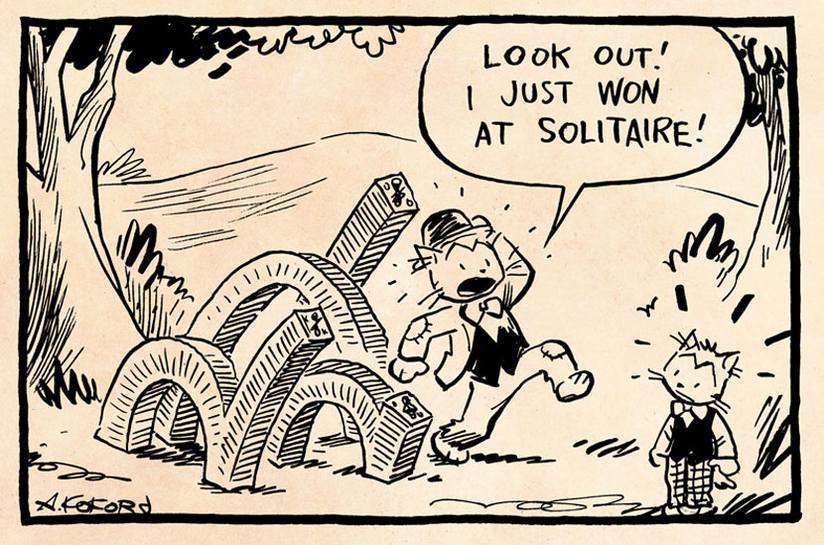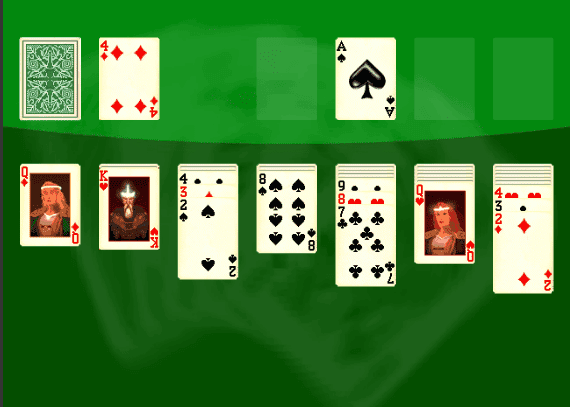
For any of you who used early Windows PC’s, I am sure many of you have played the game of solitaire. In fact, Solitaire recently celebrated its 25th year anniversary on May 18, 2015. To celebrate its anniversary here are some interesting facts you may not have known about Solitaire.
1. The card game Solitaire was included in Windows because Microsoft wanted to teach people how to drag and drop.
The game was developed in 1989 by then intern Wes Cherry, who famously received no royalties from his work and the card deck was designed by Macintosh pioneer Susan Kare. The main intention of Windows Solitaire was to “soothe people intimidated by the operating system” at a time where many users were still unfamiliar with graphical user interfaces. It helped users become familiar with using a mouse and taught them drag-and-drop techniques which was required for moving the cards. Later versions of solitaire such as the version included in Windows 2000, allowed user to right-click on open spaces to automatically move available cards to the four foundations in the upper right-hand corner (later versions you can simply double click). Since its debut, lost business productivity by employees playing Solitaire has become a common concern since it is included in many standard Microsoft Windows operating systems. Check out this article about one famous incident regarding solitaire that happened in 2006.
2. Solitaire was not included in Windows 8 and in order to play it you had to download it from the Windows Store
Despite Solitaire being included for free for 25 years, it was not included in Windows 8 or Windows 8.1. After some outcry, Microsoft produced a new adware version of the game called the Microsoft Solitaire Collection, which required users to download it through the windows store. The “free version” of the game was embedded with ads and forced you to watch advertisement videos before you were able to play. The game even included a valueless in-game currency in order to increase monetization of users. In order remove them you had to pay $1.49 /month or $10/ year. Gizmodo characterized Microsoft’s behavior as a way to “nickel and dime” users, writing that “something with used to come on your PC for free is now corrupted by ad buys”. PC gamer commented too stating that “the ads in question aren’t small banners that appear at the bottom of the screen while you play. They run over the full solitaire window, some for as long as 30 seconds, and while they don’t seem to pop up very often…they can’t be aborted. Rock, Paper, Shotgun said that the changes are a “particularly heartbreaking sign of the times” and that some users would find it “profoundly sinister “a large corporation is gather and storing vast amounts of data on your computing habits, and not simply what you do in a browser”. (Apparently this behavior has seemed to continue in Windows 10, which tracks everything from your keystrokes to your speech). For any of you may fall into this category I suggest you play Solitaire online for free at www.solitairebliss.com.
3. There are five main variations of Solitaire
The five main variations of solitaire are Klondike, Freecell, Spider, Tripeaks, and Pyramid. In fact there are even more variations of the game, but these are the most well known. Many variations allow different customization options for users.
4. The highest score you can earn in the original version of Microsoft Solitaire is 24,113.
You get 10 points for each card added to the aces pile (also known as the “home stack”) and five points for each time you move a card from the deck to a column (correctly). There is also a time bonus for games that last longer than 30 seconds (700,000 divided by the total time in seconds it took you to finish.) The high score changes from version to version. Below is a video of someone reaching the high score of 745 in the Windows 7 version of Solitaire:
5. It’s not all luck – you really can increase your chances of winning
There are several strategies to help you win at solitaire. By keeping the vertical line of visible cards evenly distributed instead of focusing on completing one at a time, it enable syou to make more moves elsewhere and can improve your time. Focus on the face-down cards so you know what your working with, instead of moving cards just because you can. For three card draws, playing all three cards in the dealt pile is also not the best idea, as you want to be able to see as many cards as possible in that deck to know what options you have there and playing all three will keep them all in the same order. Finally, don’t be too eager with the stockpile. Only play a card from that pile if there are no other options available within the other stacks You can find more helpful tips on this handy list from MSN Games or here from Solitaire Bliss.
6. Winning is more likely than you may think
Though the chance of this is low it is possible to receive a solitaire deck that is unsolvable. Three factors can play into this: No aces are in the fifteen playable cards, none of the seven playable cards in the row stacks can be moved to a different row-stack, or none of the eight playable cards in the deck can be moved to any of the seven row-stacks. The chances of this happening are about 1 in every 400 solitaire games…so as it turns out, most games are lost because of user error.
7. The origins of the game of Solitaire date way back to the 19th century
Solitaire, also known as “Patience” in many European countries was most likely German or Scandinavian in origin. The game became popular in France in the early 19th century reaching England and America in the later half. Patience was first mentioned in literature shortly after fortune-telling layouts were developed around 1765. The earliest known recording of a game of patience occurred in 1783 in the German game anthology Das neue Königliche L’Hombre-Spiel. Some people use the game of “Patience” as a guide to the future. This assumes that a person’s luck will vary and important matters should not be initiated when the cards are not favorable. If you want to learn more information about the game of Patience view the Wikipedia page.


